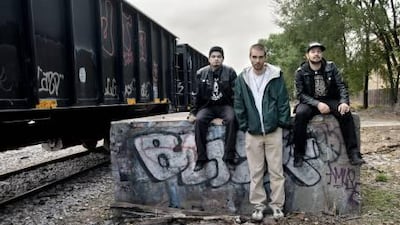"I had always been into punk rock music," says Marwan Kamel, 25, of Chicago. "Black Flag, Crass, those kinds of bands." That's one form of rebellion, but his musical epiphany would come on a 2001 visit to Syria, his father's native land, when he was in high school.
"Over there, music is everywhere, it's unavoidable," he says. "I think people here get the wrong impression of what it's like over there - stuff that happens there, I can't ever imagining it happening in the West. Like you're just on a bus, and someone just gets up in the aisle and starts dancing. When I heard Middle Eastern drumming, I thought: 'All right, punk drumming is fast, but this ... is really fast'."
And then he thought: wouldn't it be crazy if I combined them?
Music: The National listens
Music reviews, festivals and all things sound related
The result is Al Thawra, an experimental metal punk band with a backbone of Middle Eastern rhythms and modes. And congratulations if you're thinking that hasn't won them a Super Bowl gig.
Al Thawra stand at a crossroads of cultures, fully embraced by none; as such, the band is an extension of Marwan himself, who exists between the worlds. "You hear the way they talk about Arabs on TV here, but in the Middle East, I'm still always 'the American kid'," he says.
And so Kamel envisions forging a "third identity" between the "false dichotomy of East and West". That new identity is still quite radical, even in rock 'n' roll.
Kamel grew up in a majority Latino community in Chicago, and his band reflects that collision and fusion: they're uncommonly multicultural. Sahar Salameh joined on vocals, percussion and electronics at 16 (she's now 20). Bassist Mario Salazar is of Mexican extraction, adding "another politicised identity" to the band, Kamel says.
"We're two cultures that are under the gun in America right now," he says.
Sure, but not in the music community. Music equals freedom, right? And punk, well - those lefties would offer a haven to any minority.
"I always felt about punk and metal that it was a safe space to be yourself," Kamel says, "but the reality is, it comes with its own rules of conformity. I don't mean to go on this post-colonialist tirade, but people were trying to digest what we're doing from a moral high ground, saying: 'If you guys are here, then you've gotta play our music.' What does that mean?"
It means that music is, inescapably, an expression of deeper cultural roots.
"People in the activist punk community are very informed by this atheist anarcho-punk stuff - but the thing about all of that is that it talks about things in a Christian framework and context. Even death metal - if you think about it, a lot of that stuff, about eschatology and good and evil, is more Christian than the Christian bands! A lot of the quote-unquote apostasy in their imagery is based on Christianity. In Islam, some of that stuff doesn't even make sense."
Although his father is Syrian, Kamel's mother was raised Catholic. "I do [identify as a Muslim] but I don't really talk about that in the music. I'm more influenced by the mystical paths of Islam. Like Sufism. I'm not trying to proselytise anything. I speak to it in a vague, secularised way, using Sufi imagery and stuff."
Al Thawra means "the revolution" in Arabic - in Kamel's case, a revolution in consciousness or at least cultural dynamic. "A lot of the press we've got made it seem like post-colonial identity was the end point. But that's the starting point," he says.
"The mentality of people in the minority and of the colonised is usually one that looks outward for problems that are superimposed, and it's demoralising. We are treated as 'the other' and spoken of in a way that is dehumanising, or more easily represented by statistics like '4,000 killed in the Syrian uprising' or 'millions of undocumented Mexicans' or 'thousands flee floods in Pakistan'.
"In Al Thawra, we're trying to drive people towards looking inward and asking legitimate questions about themselves and trying to get them to believe in themselves. After that, they can look outside for solutions. In other words, we're trying to humanise the other and give us a voice. In a sense, we've chosen punk, metal and harsh textures to do this. It seems like an oxymoron, but sometimes the most visceral things force you to look deeper."
Yes, but the band exists in a context - it was formed during the Iraq War - and there will be constant reminders. "On our way to our UK tour, I did get the X-ray and fingerprint treatment in Canada. And on the way there and back, I was randomly selected to have my bags opened. I got these little notes from Homeland Security inside my bags saying: 'Your bag has been chosen to be opened for the safety of your fellow passengers'."
Al Thawra found inspiration in meeting their contemporaries from Iraq, the band Acrassicauda, stars of the 2007 DIY rockumentary Heavy Metal in Baghdad.
"Those dudes stayed with me when we played a gig together at the Empty Bottle in Chicago. When they left Iraq, the first place they went to was Syria. They were telling me about playing a show there, playing covers by big metal bands. I don't know if it would be possible to play there right now, but in the Gulf, the metal scene is growing a lot. There is an audience for it.
"I think everything is opening up, possibilities are opening up. I hope someday we'll be able to play the Desert Rock Fest in Dubai."
And so Kamel finds exclusion can be universal.
"There's always the outsider. And somebody's gotta play music for the outsider. And I guess that's us.
"It ruffles some feathers, but that means you're doing something right."

